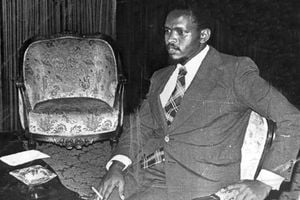SAN ANTONIO - A Bexar County jury has sentenced rapper Taymor McIntyre, known as Tay-K 47, to 80 years in prison for the murder of Mark Anthony Saldivar, a photographer, in a case that highlights the complexities of youth crime and the impact of a turbulent upbringing.
On April 15, 2025, the jury delivered its verdict after deliberating for about four hours, finding McIntyre guilty of murder stemming from the 2017 shooting. Originally charged with capital murder, which could have led to a life sentence without parole, the jury opted for the lesser charge due to McIntyre's age at the time of the crime—he was just 16 when he pulled the trigger.
Judge Stephanie Boyd, who presided over the case, emphasized the gravity of the situation when she addressed McIntyre directly, stating, "I do realize that while this is a lot of time, you’re still alive. You can still better yourself. But the complainant in this case is deceased, and you need to internalize that the complainant in this case is deceased. You’re going to have to make changes.”
McIntyre, now 24, was found guilty of fatally shooting Saldivar after attempting to rob him of his photography equipment outside a Chick-Fil-A in San Antonio. Prosecutors described how Saldivar had been asked to take photos of the rapper for a new song, only to become a victim of a violent robbery.
According to evidence presented during the trial, Saldivar was shot after McIntyre and his friends picked him up, leading to a physical altercation that ended with Saldivar being shot and left for dead. Eyewitnesses reported seeing a black car with a passenger waving a gun and demanding Saldivar's backpack, which contained his camera gear.
Defense attorney John Hunter argued that the police investigation was flawed, relying heavily on witness testimonies that he claimed were self-serving. “Taymor McIntyre is not guilty of capital murder, murder, or manslaughter, and the reason for that is very simple,” Hunter told jurors during closing arguments. “You have to do it right. You have to do the work. And this case clearly demonstrates the work wasn’t done.”
Despite the defense's efforts, the jury convicted McIntyre, marking his second murder conviction. He was previously sentenced to 55 years for the 2016 murder of Ethan Walker during a home invasion in Tarrant County, Texas. This earlier case involved McIntyre allegedly organizing the crime and recruiting others to carry out the shooting.
The sentencing has sparked discussions about the influence of McIntyre's upbringing on his actions. During the trial, his sister, Kayla Beverly, testified about their unstable childhood, which included being placed in foster care and enduring abuse. She described their mother as having struggled with drug addiction, leading to a turbulent home life. “We wanted her to love us, but she was always disappointed in us and we'd be accused for things we didn't even do,” she said.
Experts testified about the impact of generational trauma on McIntyre's behavior, noting that he came from a background filled with violence and instability. A forensic psychologist pointed out that McIntyre's brain was still developing at the time of the crime, which could have affected his decision-making.
Judge Boyd acknowledged the difficult circumstances of McIntyre's childhood but ultimately stressed that they could not excuse his actions. The judge ordered that McIntyre's sentences for both murders run concurrently, meaning he will serve them at the same time. He is also prohibited from contacting Saldivar's family except for legal matters.
The case has drawn significant media attention, particularly due to McIntyre's music career. His single, "The Race," became a viral hit in 2017, accumulating over 250 million views on YouTube and 416 million streams on Spotify. The song was released while he was on the run from authorities, capturing the public's fascination with his story.
As the trial concluded, a representative for Saldivar's family read a victim impact statement that poignantly expressed the loss felt by those left behind. The statement highlighted how Saldivar's dreams, ambitions, and aspirations were taken away because of McIntyre's actions.
This case serves as a stark reminder of the consequences of youth violence and the challenges faced by those who grow up in difficult circumstances. As McIntyre begins his lengthy prison sentence, questions remain about the role of environment, personal choice, and the potential for rehabilitation in the lives of young offenders.
As the legal proceedings come to a close, the community reflects on the tragic loss of a young life and the impact of crime on families and society as a whole. Tay-K's story is one of both talent and tragedy, leaving behind a complex legacy that will be discussed for years to come.









